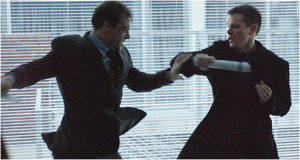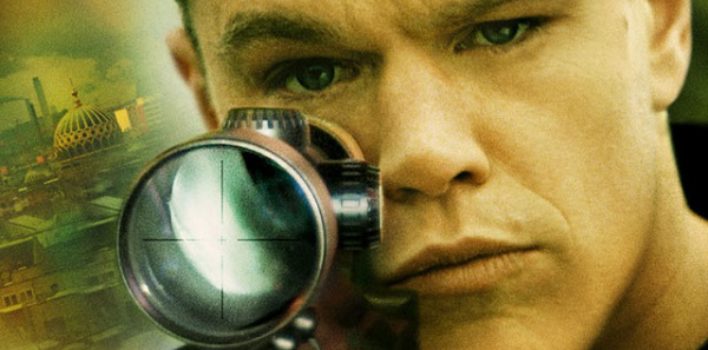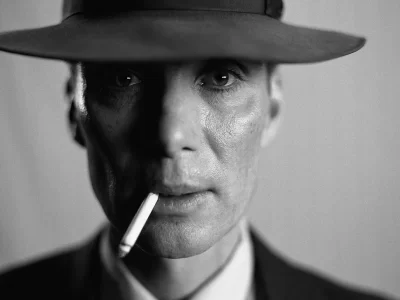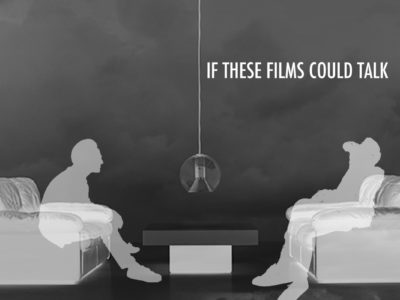Review| The Bourne Supremacy
 Jason Bourne (Matt Damon) is alive and back in this critically acclaimed sequel and this time it’s personal! Actually, it was pretty personal in the original film. In 2002’s The Bourne Identity Jason had to re-discover who he was after sailors found him floating in the Mediterranean with a couple of bullets in his back and a persistent case of amnesia. By the end of that film, after the slow reveal that he was an agent with a black ops arm of the CIA known as Treadstone, Jason decided to withdraw from government thuggery and take a permanent sabbatical with Marie (Franka Potente), his newfound love. The last thing he murmured to his former CIA superior before disappearing forever was, “Jason Bourne is dead.” But the dead don’t stay buried very long.
Jason Bourne (Matt Damon) is alive and back in this critically acclaimed sequel and this time it’s personal! Actually, it was pretty personal in the original film. In 2002’s The Bourne Identity Jason had to re-discover who he was after sailors found him floating in the Mediterranean with a couple of bullets in his back and a persistent case of amnesia. By the end of that film, after the slow reveal that he was an agent with a black ops arm of the CIA known as Treadstone, Jason decided to withdraw from government thuggery and take a permanent sabbatical with Marie (Franka Potente), his newfound love. The last thing he murmured to his former CIA superior before disappearing forever was, “Jason Bourne is dead.” But the dead don’t stay buried very long.
The Bourne Supremacy (2004) brings back some familiar faces: Damon returns as Jason Bourne, the brooding antihero plagued by his mysterious past, as well as Potente as Marie, Julia Stiles as CIA support technician Nicky, and Brian Cox as manipulative villain Ward Abbott. There are also some new faces: Joan Allen as Deputy Director Pamela Landy and a young Karl Urban as Kirill, a constantly scowling Russian assassin.
While the stakes have changed, the story remains the same. Jason still hasn’t regained his memory. Now, he suffers from flashbacks of his dark past as a black ops agent. When Marie is killed by Kirill, Jason is immediately thrust back into the manic-paced journey of peeling back the layers of his past; but what he ultimately finds is more tragic than he could ever realize.
Review
The Bourne Supremacy is a fun and fast roller coaster ride from start to finish, just as good as the original. While Paul Greengrass has taken over the director’s chair (from Doug Liman), things look relatively the same. The pace is still as frantic as ever, the spycraft is just as interesting, and the script is solid, witty, and relatively trim of unnecessary elements (save one or two lazy bits of expositional dialogue). Of note is a contrast of color schemes as the saturated earth tones of the opening sequences in India change to the anemic blues and greens of the CIA offices and various locations important to Jason’s past. This is all to suggest a return to the cold and mechanical that he is so familiar with now that Marie is dead. Unfortunately, as this is a popcorn action film, Marie is treated merely as a plot device and forgotten immediately since there is hardly any time spent developing a love story (even in the original). But almost no guy I know is bothered in the slightest by this, so I’ll say no more about it.
 Not only is Jason Bourne back with a vengeance, so is the shaky-cam in all its irritating splendor. The original Bourne film was one of the first (along with Steven Spielberg’s Saving Private Ryan) to feature the shaky-cam as a device intended to elicit a feeling of participation from the viewer. In theory this sounds perfectly fine, but the problem with the Bourne films is it gets worse over time until you’re halfway through the film wondering who the heck is punching who while popping some Dramamine. As a matter of fact, the shaky-cam got so bad by the time The Bourne Ultimatum hit theaters in 2007 that Richard Corliss of Time Magazine referred to some scenes as “agitated bits” and others as having been filmed by a camera “afflicted with Parkinson’s”.
Not only is Jason Bourne back with a vengeance, so is the shaky-cam in all its irritating splendor. The original Bourne film was one of the first (along with Steven Spielberg’s Saving Private Ryan) to feature the shaky-cam as a device intended to elicit a feeling of participation from the viewer. In theory this sounds perfectly fine, but the problem with the Bourne films is it gets worse over time until you’re halfway through the film wondering who the heck is punching who while popping some Dramamine. As a matter of fact, the shaky-cam got so bad by the time The Bourne Ultimatum hit theaters in 2007 that Richard Corliss of Time Magazine referred to some scenes as “agitated bits” and others as having been filmed by a camera “afflicted with Parkinson’s”.
The Morality of Jason Bourne
The question viewers should be asking themselves by now is: Is Jason a good guy or a bad guy? From the very beginning, as we track his journey, this particular question and its corollaries is ever present. In other words, if Treadstone once turned him into a cold-blooded killer, is he still a cold-blooded killer now that he’s lost his memories? Ward Abbott seems to think so. In a pivotal scene where Jason confronts Ward for his deception and murder of Marie, Abbott says, “It’s what you are, Jason. A killer. You always will be.” But is that really true? Is Jason the assassin he once was?
I’m reminded of a similar scenario in the cult classic Dark City (1998) where an entire community is continually stripped of its memory every night by a mysterious group of strangers in order to see whether the townsfolk will act differently in new situations. Interestingly enough, both Dark City and The Bourne Supremacy ultimately affirm a Christian worldview; that is, there is something innate in us that informs our sense of morality. The apostle Paul says that, “since the creation of the world [God’s] invisible attributes, His eternal power and divine nature, have been clearly seen… so that they are without excuse” (Romans 1:20). It is understood that God’s nature provides the grounding of our moral convictions. Even when perversity is present, at base there is still an innate knowledge of the truth, according to Paul.
 While this notion plays out very subtly in the Bourne films, it still should not be missed. Jason has been conditioned by the CIA to become an assassin, an unthinking, deadly reflex of CIA muscle (and that’s explicitly unpacked in The Bourne Ultimatum). But the fact that he switches from being a cold-blooded killer to a remorseful justice-seeker is indicative of the innate moral compass that Paul is referring to. Think about it: Jason is starting afresh. He’s a tabula rasa of sorts; and yet here he is guided by a sense of righting wrongs and getting the truth out. This is not social conditioning, the influence of parents or peers during a period of crucial childhood development. This is indicative of a spiritual understanding of objective moral facts and how they should guide one’s actions. It’s still there when nothing else about Jason (real name: David Webb) can be known.
While this notion plays out very subtly in the Bourne films, it still should not be missed. Jason has been conditioned by the CIA to become an assassin, an unthinking, deadly reflex of CIA muscle (and that’s explicitly unpacked in The Bourne Ultimatum). But the fact that he switches from being a cold-blooded killer to a remorseful justice-seeker is indicative of the innate moral compass that Paul is referring to. Think about it: Jason is starting afresh. He’s a tabula rasa of sorts; and yet here he is guided by a sense of righting wrongs and getting the truth out. This is not social conditioning, the influence of parents or peers during a period of crucial childhood development. This is indicative of a spiritual understanding of objective moral facts and how they should guide one’s actions. It’s still there when nothing else about Jason (real name: David Webb) can be known.
Now, Jason’s moral compass is still somewhat off. He doesn’t seem to care about smashing into innocent people during car chases or harming otherwise innocent folks who happen to get in his way. Nevertheless, there is an overarching guiding principle that informs his decision-making: the bad guys must be thwarted. Jason could not have been taught this. He simply knows this moral sense of justice by direct awareness, which Christianity can explain very well.
Conclusion
Despite an over-used shaky-cam, some unnecessary exposition, and that annoying soundtrack every time someone realizes Jason’s watching them from another building, The Bourne Supremacy is a worthy sequel every bit as fun and exciting as the original.







